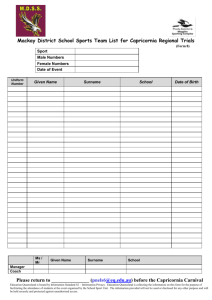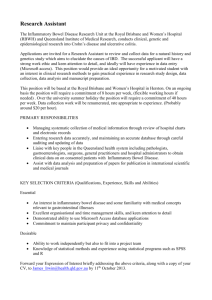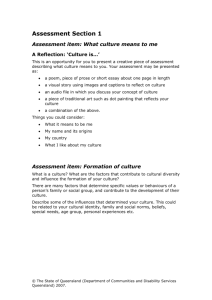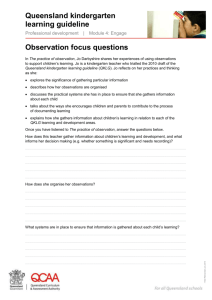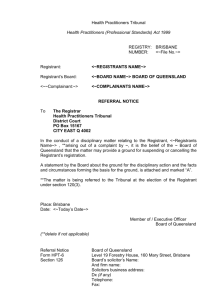PDF, 1.6MB - Old Government House
advertisement
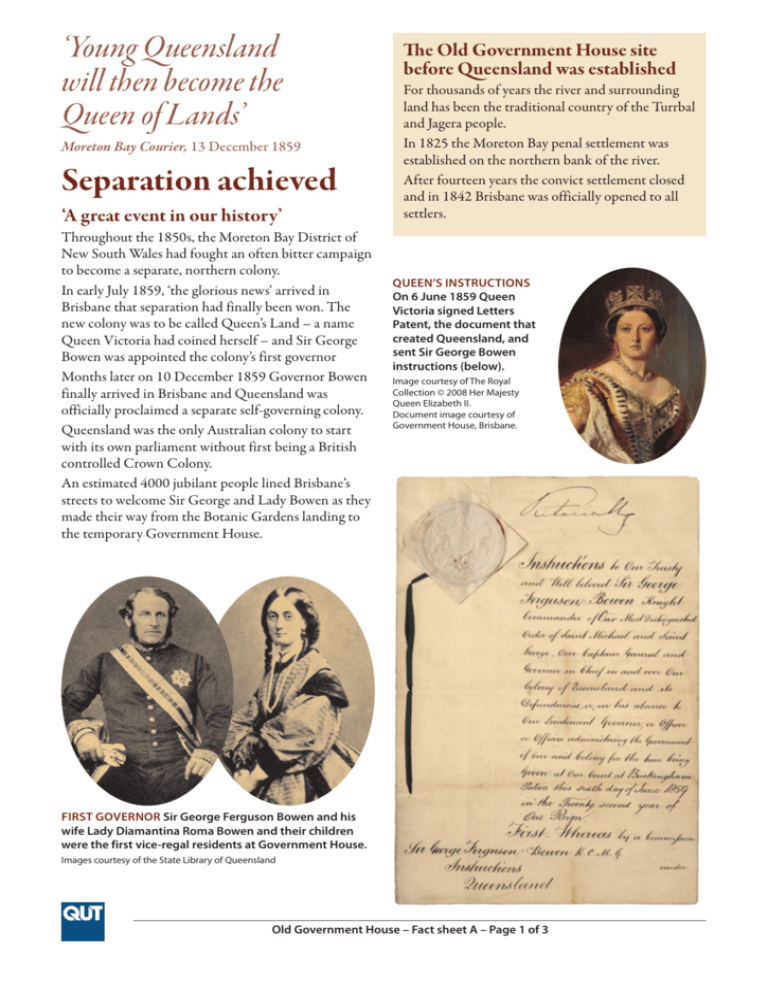
‘Young Queensland will then become the Queen of Lands’ Moreton Bay Courier, 13 December 1859 Separation achieved ‘A great event in our history’ Throughout the 1850s, the Moreton Bay District of New South Wales had fought an often bitter campaign to become a separate, northern colony. In early July 1859, ‘the glorious news’ arrived in Brisbane that separation had finally been won. The new colony was to be called Queen’s Land – a name Queen Victoria had coined herself – and Sir George Bowen was appointed the colony’s first governor Months later on 10 December 1859 Governor Bowen finally arrived in Brisbane and Queensland was officially proclaimed a separate self-governing colony. Queensland was the only Australian colony to start with its own parliament without first being a British controlled Crown Colony. An estimated 4000 jubilant people lined Brisbane’s streets to welcome Sir George and Lady Bowen as they made their way from the Botanic Gardens landing to the temporary Government House. The Old Government House site before Queensland was established For thousands of years the river and surrounding land has been the traditional country of the Turrbal and Jagera people. In 1825 the Moreton Bay penal settlement was established on the northern bank of the river. After fourteen years the convict settlement closed and in 1842 Brisbane was officially opened to all settlers. QUEEN’S INSTRUCTIONS On 6 June 1859 Queen Victoria signed Letters Patent, the document that created Queensland, and sent Sir George Bowen instructions (below). Image courtesy of The Royal Collection © 2008 Her Majesty Queen Elizabeth II. Document image courtesy of Government House, Brisbane. FIRST GOVERNOR Sir George Ferguson Bowen and his wife Lady Diamantina Roma Bowen and their children were the first vice-regal residents at Government House. Images courtesy of the State Library of Queensland Old Government House – Fact sheet A – Page 1 of 3 A fitting residence for the governor A new Government House planned Britain’s newest and largest colony began with no money in the treasury and a population of just 25,000. Queensland’s emerging capital Brisbane was little more than a frontier town. For this new colony a priority was the construction of a fitting vice-regal residence. On 21 June 1860 Queensland’s first parliament voted a significant allocation of £10,000 to build a new Government House. Within weeks the newly-appointed Government Architect, Charles Tiffin had commenced the plans and by late August Joshua Jeays had been appointed builder. Construction began in October on a ‘delightful’ rise of ground in the government domain that commanded ‘a splendid view of the river.’ Swiftly constructed In April 1861 the main brick walls were completed, in July the servant’s wing at the rear was underway and September saw the completion of the House’s twostorey sandstone clad exterior. By October, the slate roof was in place and Walter Hill, Director of the Botanic Gardens was laying out the garden. By December much of the interior decoration had been finished and Mr. Petrie’s work on the stables, guard house and entrance gates was nearing completion. The final fit-out of the House with local and imported furniture, imported marble mantelpieces, chandeliers and carpets took place in March 1862 and the House was completed the following month. BeAutiFuLLY situAteD Facing the river and built on an elevated piece of land Government House presented a most impressive site to ship passengers as they sailed around the Gardens Point bend of the river. Ham’s 1863 Map of Brisbane courtesy of State Library of Queensland. Queen street in 1860 Brisbane had one main street, Queen street, and most of the town’s 7000 inhabitants lived in rustic wooden houses scattered about in the bush. Image courtesy of the State Library of Queensland Old Government House – Fact sheet A – Page 2 of 3 The House completed and occupied ‘Handsome and commodious’ In May 1862 Governor Bowen and his family and entourage moved in. Bowen was clearly pleased with the House informing the Secretary of State for the Colonies that: I have this month entered into occupation of the handsome and commodious official residence… Besides good public reception rooms, and private apartments for the Governor and his family, the Government House contains also the Executive Council Chambers, and offices for the Private Secretary etc. At a final cost of £18,700 Queensland’s Government House was ‘the most economical vice-regal residence in the Australian colonies.’ Tiffin’s design was simple and elegant. It modified the Greek revival architectural style to better suit Brisbane’s tropical climate, in particular with its system of ventilation and use of controlled natural light. A British traveller later remarked ‘I envied him his house, which was airy, spacious, well-built and pretty’. QueensLAnD’s Vice-reGAL PALAce the general verdict on the completed Government House (shown here in 1868) was that it was a ‘structure… highly creditable to the colony’. Later additions, particularly the roofing of the open terraces in 1872, and the carriage portico in 1878 reflected a continuing process of adaptation to local conditions. ArcHitect’s DrAwinGs charles tiffin’s design for the House. tiffin designed over 300 of Queensland’s public buildings including Parliament House. Plans courtesy of Queensland State Archives and the National Trust of Queensland Image courtesy of the State Library of Queensland. Old Government House – Fact sheet A – Page 3 of 3


